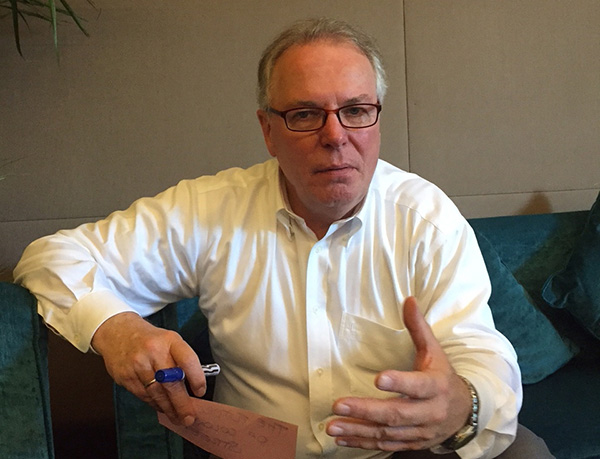Challenge for Cebu: Switching to public from private transport

Dr. Manfred Poppe, senior project manager of Connective Cities project, discusses urban development and mobility at the sidelines of the International Community of Practice for Sustainable Urban Development Conference. (CDN PHOTO/VANESSA CLAIRE LUCERO)
How to convince commuters with cars to take the public transportation system and thus, lessen the number of vehicles on the road, is a challenge that Cebu must address.
Dr. Manfred Poppe, GIZ GmbH senior project manager for Connective Cities, said public transport must be made attractive to commuters who have enough spending power to own cars.
“The low quality of existing transportation can dissuade people from using public transport,” he said.
Concerns typically raised by private car users include safety, comfort and reliability.
Thus, public transport, specifically high quality transport, is heavily needed to encourage private car users to switch to public transport, Poppe said.
GIZ GmbH is spearheading a workshop as part of the International Community of Practice for Sustainable Urban Development Conference to address urban development problems, particularly on transportation and urban mobility in Cebu.
Poppe said the most critical point in discussion is how to change individual commuter behavior from using private cars to using public transport.
Three working groups have been created, addressing specific problems in the city, namely: the Colon quarter; a holistic vision for public transport and mobility in the city; and developing a socially inclusive bus rapid transit (BRT) system.
In line with developing a socially inclusive BRT, transport practitioners will be talking about how the basic concept of the BRT can be modified to address the specific user needs in Cebu, including affordability across different socio-economic segments, and gender-specific needs among others.
Poppe added that as a whole, the second working group will focus on looking into the possibility of integrated mass transportation systems, as well as find a good balance between public transportation and private vehicles.
National Economic and Development Authority (NEDA) regional director Efren Carreon said that a mass transportation system is “very much needed” in the city.
“This will save road space, and more people can be accommodated,” he said. The use of a public transport system will hopefully get more private cars off the road.
At the same time, they will be looking into slowly integrating this with other public vehicles.
Traffic situations for both cars and people will be addressed in Colon.
Proposals for medium- to long-term action plans highlighting solutions to these problems will hopefully be created during the discussions by the working groups, said Poppe. Ultimately, however, it is up to Cebu and its transportation sector to be able to carry these plans out.
Now on its second year, GIZ GmbH’s Connective Cities project continues to create a network of urban practitioners in various industries and cities who are able to share best practices and technical know-how with each other in order to achieve sustainable urban development.
Conference participants include transport experts from Germany, Indonesia, Malaysia and the Philippines.
Disclaimer: The comments uploaded on this site do not necessarily represent or reflect the views of management and owner of Cebudailynews. We reserve the right to exclude comments that we deem to be inconsistent with our editorial standards.
